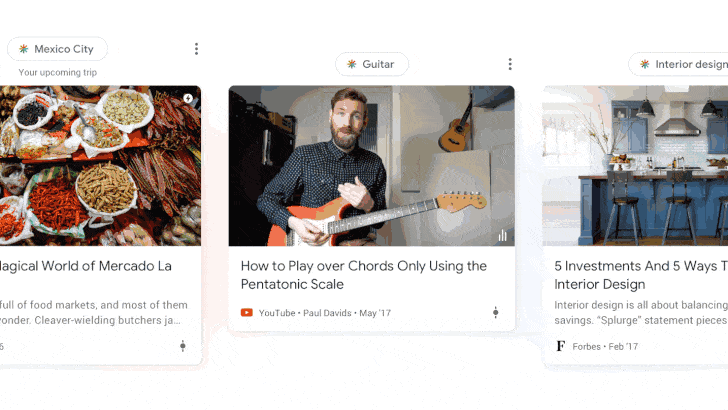Today Google announced that it's rebranding its well-known Feed — a source of news for consumers and referral traffic for providers like Android Police — under the new name "Discover." With the change in name comes the formal announcement of the redesign that's been in testing for a while now, plus more granular control on topics, and multi-language support for different types of content. By far the biggest change, though, is the addition of the new Discover to the Google homepage on mobile.
Hints of the name change cropped up a few days ago, along with a new asterisk icon. Based on the GIFs provided, each topic will also get a seemingly superfluous multicolored version of the same icon alongside the new topic headers. Back in 2017, Google revealed the ability to follow individual topics, and earlier this year topic pages began to appear in Feed. Apparently, these new changes build on that foundation, expanding the granularity of control when it comes to specific subjects.
Just tap the new icon on the bottom right, and you can adjust between "more" and "less" coverage of a specific subject in the future.
Multi-language support is also coming to Discover, with an interesting twist: You'll be able to configure (in some yet undefined way) for certain content to arrive in one language over another. For example, if you like sports in one language, but recipes in another, you'll be able to ensure each gets its own.
For now, Google is starting with English and Spanish in the US, but other languages and countries will be supported in the future.
So-called "evergreen" content, which you may have noticed at the bottom of your feed already, is also getting a renewed focus in Discover. Evergreen content, for those out of the loop, is stuff that might be older, but which is presumably new to you, or newly relevant. Stuff like travel content when visiting a new city, or good but older coverage on a newly discovered topic. Discover will be predicting your "level of expertise on a topic" to help you find older but still relevant information as you expand your knowledge.
By far the most significant user-facing change, though, is the addition of Discover to the Google homepage for mobile devices. Historically Google has been incredibly conservative when it comes to making changes to the google.com landing page. I don't think I'm exaggerating when I say this is probably the biggest and most impactful change Google has made to any of its services in years. For Google to be willing to place Discover on its homepage, it must have tremendous faith in it. It's probably the single most accessed URL in the world, and as it rolls out in the next few weeks, every person that goes there on mobile will see new customized content.
I'll be curious to see precisely how the page works vs. the Google app, but either way, it's huge news.

